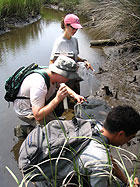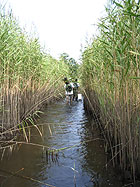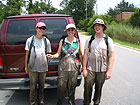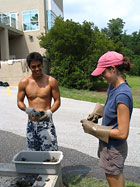

 | |||||||||||||||
|
|
Journals 2006/2007Anna Hilton
August 7, 2006 The team leaders discussed tides, departure times, and crew team members at dinner the night before. My team leader was Lisa Hayes. Our team for that day's water and soil sampling included Lisa, myself, Travis and Kolo. Kolo went along with a different team each day to collect oysters for his microarray oyster study. Guy took Sara and Mark for the water and soil sampling at the other order in Hewletts Creek. We left earlier than Cindy, Angela, and Pat. They left later than we did so that they would have more water in the creek to launch the research boat.
I was concerned with the heat in the marsh. There had been heat records broken the week before in Charleston. My daughter works outside and suggested that I wet my hat to keep cool outside in the sun. Safety is always a priority for Guy. Water and sunscreen are standard equipment in the field. I always brought extra water and Gatorade along in my backpack. Travis and Lisa pushed the sonde pole into the mud and attached the PVC pipe that would house the sonde in the creek. The sonde was carefully placed into the pipe and set to record the water properties for twenty-four hours. The day went well except that a sharp blade of needle rush (juncus) stuck Lisa in the eye. She warned us to tread very carefully through the juncus. Travis tickled me when he tasted the water in the creek. He noticed the water was cooler than the water in the creeks sampled in Georgia and South Carolina. He tasted the water to observe the salinity in the creek. Lisa laughed at him. I didn't think it was such a good idea to put Hewletts Creek water in his mouth. I was so pleased to be able to take a video of Lisa and Travis taking the soil sample as Lisa explained to me what the scientists looked for in the sample. I noticed the fiddler crabs seemed bigger in this creek than the ones I knew in the South Carolina marshes. We wondered if the creek had a fresh water spring that caused the water to be cooler. We collected the samples from each reach and I so enjoyed helping and hiking through the tall grasses of the marsh. Lisa took a sample of the tall grass back to the marine center. The creek was beautiful and I wondered if the neighborhood children ever walked through the marsh looking for fiddler crabs and adventure.
We were a muddy team when we returned to the marine center to store the water and soil samples. We compared the day with the other research teams while Kolo made slides and processed his oyster samples.
Angela had trouble launching the boat because of too little water in the creek that morning. They decided to leave even later the next day to take advantage of a higher tide. I asked Pat (biota expert) about the larger fiddler crabs. He told me there were many species of fiddler crabs. Did each species live in slightly different habitats? Everyone was in good spirits and we debated where we would eat that night.
|
||||||||||||||



